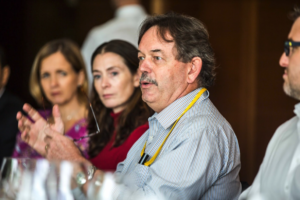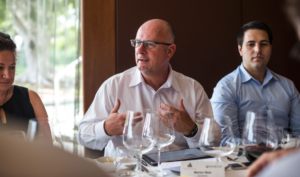Driving a Digital Agenda in Government: Citizen-Centric, Agile and Fast
In August of 2017, Queensland’s Minister for Innovation, Science and the Digital Economy, The Hon. Leaane Enoch launched the state’s…
In August of 2017, Queensland’s Minister for Innovation, Science and the Digital Economy, The Hon. Leaane Enoch launched the state’s latest “Digital 1st” innovation strategy. The strategy will focus on improving Government delivery by taking a holistic approach to digital delivery.
Critical to the blueprint is the concept that Queensland needs to adopt a “Government-as-a-platform” approach to digital infrastructure. The state must ensure that innovations are developed and implemented quickly into the system in order to take advantage of best of breed technologies.

With Ernst & Young reporting that Australia has slipped in global digital rankings (we are currently sitting at 18th with a view that we could fall even further behind), Queensland’s digital-first strategy has never been more relevant for Agency’s and Department’s to respond to.
This was the backdrop of the discussion at February’s ‘Driving a Digital Agenda in Government: Citizen-Centric, Agile and Fast‘ luncheon hosted by Dynatrace in Brisbane. The keynote presenter for the luncheon was Andrew Mills, the Chief Information Officer for the Queensland Government, with the event moderated by Martyn Beal, the regional director for Government for ANZ.
The open discussion provided insights into the challenges that C-Suite technology and operations executives have when developing digital agenda. This is both in relation to the framework of pre-existing infrastructure, as well as the culture of Government and responding to the change.
Building the Right Digital Framework
In line with the Government’s Digital 1st Strategy, Andrew outlined three critical domains that the Queensland Government should be concentrating on. Citizen services, building a digital Queensland, as well as looking at how Queensland can become a digital Government.
“Citizen Services looks at the whole of Government, how do we deliver digital services to our citizens?” Andrew said.
“Digital Queensland is the economy, it is the jobs. How do we get citizens more digitally enabled? This is a broader focus, it is not an ICT focus, it is a digital focus.”
Critical to the discussion was the third element, which looks at how Queensland can become a digital-first Government. If Queensland is to lead the way in the digital economy, the Government has to act as a benchmark.
“If we want to be the state of digital, we as the Government better be leading the way, we need to be executive class. We could be doing so much more towards this.”
Andrew’s framework for Queensland’s approach to digital outlined to the group that digital delivery goes beyond the traditional role of the Government ICT executives. Departments will no longer be able to approach digital within the context of another IT project, in order to embed a new digital framework, plans must be holistic.
Department’s Need to Work at Speed
Working at speed and efficiency, and not to a project timeline, was an element that Andrew and the group identified as being an inhibitor to digital transformation success.
For too long Government ICT activities have worked within a framework based around project management principles. However as Andrew identified, the “solution” often changes by the time the project has been successfully completed.
“If you are doing a project plan for three months, there is a high chance the problem has changed since you have had the plan in place.”
The discussion extended beyond just working on a project, with the group feeling that the success of Queensland’s robust Government IT framework as being of detriment to the new, agile, world.
The conversation around this looked at how teams should be applying agile methodologies and technologies – such as Dynatrace’s that work off continuous improvement principles – whilst also maintaining the robust core of IT infrastructure operations which Queensland has built up.
Martyn Beal from Dynatrace offered a varied perspective on this, bringing the role of the wider vendor community in ensuring delivery.
“When moving at speed, it is important to monitor the performance of your vendor ecosystem to ensure they are delivering to their requirements. The last thing you want is outside influencers impacting your ability to deliver at speed.”
Complexity Can’t Be Ignored, Or Overcomplicated

Many executives on the table lamented that building a transformation agenda within a Government context can be complex.
For some the challenges were around a dispersed workforce, for others frameworks of legacy infrastructure, whilst almost all felt that change itself was difficult for the culture of the Government.
“While the technology group is supporting digital, digital is not a technology conversation. The problem is that business can be scared of it. Change is the hardest thing for people who have been working in government for years,” said one attendee.
Andrew’s approach to the challenge of complexity and change was to have one foot on each side of the fence.
“If you ignore the complexity, you will get it wrong. But if you concentrate on the complexity you will never get anything done. It is about balancing the two out.”
Taking small steps to success, using digital innovation as a way of motivating engagement, as well as setting realistic expectations, were all elements explored by the group around tackling the complexities of change.
Conclusion
The group in attendance are acutely aware of the challenges the Government faces in digital delivery. Not only does it require a change of technical approach, but probably more pertinent, is the change of mindset required from the Departments and Agencies.
Digital delivery is going to be one of the biggest modern day challenges for both the enterprise and Government. As the habits, technologies and expectations of the citizen changes, Governments will be required to respond quickly to these and ensure that they have the right frameworks to harness the power of new innovations.
It is an exiting time to be involved in digital transformation in Government, and based on the appetite of the citizen, it only looks set to grow in importance.





Comments